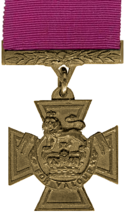John Ryan (VC 1857)
John Ryan | |
|---|---|
 | |
| Born | 1823 Kilkenny, Ireland |
| Died | 4 March 1858 (aged 34–35) Cawnpore, British India |
| Allegiance | |
| Service | Madras Army |
| Rank | Sergeant |
| Unit | 1st Madras European Fusiliers |
| Battles / wars | Indian Mutiny |
| Awards | Victoria Cross |
John Ryan VC (1823 – 4 March 1858) was an Irish recipient of the Victoria Cross, the highest and most prestigious award for gallantry in the face of the enemy that can be awarded to British and Commonwealth forces.
Details
He was about 34 years old, and a private in the 1st Madras Fusiliers (later The Royal Dublin Fusiliers), Madras Army during the Indian Mutiny when the following deed took place at the Relief of Lucknow for which he (and Peter McManus) were awarded the VC:
A party, on the 26th of September, 1857, was shut up and besieged in a house in the city of Lucknow, by the rebel sepoys...Private McManus in conjunction with Private John Ryan, rushed into the street, and took Captain Arnold, of the 1st Madras Fusiliers, out of a dooly, and brought him into the house in spite of a heavy fire, in which Captain Arnold was again wounded.
In addition to the above act, Private Ryan distinguished himself throughout the day by his intrepidity, and especially devoted himself to rescuing the wounded in the neighbourhood from being massacred. He was most anxious to visit every dooly.
(Extract from Divisional Orders of Major-General Sir James Outram. G.C.B., dated 11h October, 1857.)[1]
He later achieved the rank of Sergeant and was killed in action at Cawnpore, India, on 4 March 1858.
The medal
His Victoria Cross is held by the National Army Museum, Chelsea, London.[2]
References
- ^ "No. 22154". The London Gazette. 18 June 1858. p. 2958.
- ^ [1]
Listed in order of publication year
- The Register of the Victoria Cross (1981, 1988 and 1997)
- Clarke, Brian D. H. (1986). "A register of awards to Irish-born officers and men". The Irish Sword. XVI (64): 185–287.
- Ireland's VCs ISBN 1-899243-00-3 (Dept of Economic Development 1995)
- Monuments to Courage (David Harvey, 1999)
- Irish Winners of the Victoria Cross (Richard Doherty & David Truesdale, 2000)
- Use dmy dates from April 2012
- 1823 births
- 1858 deaths
- 19th-century Irish people
- Irish soldiers in the British East India Company Army
- People from Kilkenny (city)
- People from Kanpur
- Irish recipients of the Victoria Cross
- Indian Rebellion of 1857 recipients of the Victoria Cross
- British military personnel killed in the Indian Rebellion of 1857
- British military personnel stubs
